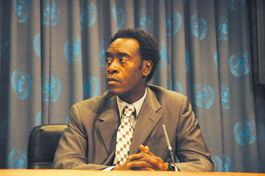home | metro silicon valley index | movies | current reviews | film review

Photograph by Samantha Casolan
BEARING WITNESS: Don Cheadle is one of six activists profiled in 'Darfur Now.'
Fighting Back
The documentary 'Darfur Now' follows six men and women trying to stop the horror
By Richard von Busack
A FEW MONTHS AGO, The Devil Came on Horseback told of the revelation of the Darfur crisis. Darfur Now shows how much progress has been made in a relatively short time. The documentary observes six men and women trying to stop the government-armed "janjaweed": irregular soldiers who have been burning, looting and raping their way through the Sudanese province. Best known of the six subjects is actor Don Cheadle, who took up the cause of Darfur and who co-wrote the book Not on Our Watch. Cheadle tries to inform the governments that are investing in Sudan of the situation, and he takes his equally famous friend George Clooney to travel with him.
In L.A., 24-year-old student activist and part-time restaurant employee Adam Sterling gets the word out about the genocide, taking his case from street corners to the California state capitol. In Darfur, we hear from Ahmed Mohammed Abakar, the sheik of the Hamadea refugee camp (population 47,000). He tries to keep peace among the traumatized and furious refugees, who keep expanding their numbers. And in the hills, Hejewa Adam camps in a burned-out house and trains with her fellow guerillas against the janjaweed. She was a mother whose child was murdered by the soldiers. Pablo Recalde, a dapper aid worker in a straw fedora and a well-groomed beard, heads the World Food Program in Darfur. In The Hague, International Criminal Court prosecutor Luis Moreno-Ocampo assembles a case against the Sudanese officials who have been trying to pretend their fingerprints aren't on the triggers.
Darfur Now gives some voice to Sudan's alibis. Recalde suggests the janjaweed might be the contents of a Pandora's box opened by the government: once unleashed, they're hard to retrieve. A group of Arabs say that they've been the victims of Darfur raiders. And Sudan's U.N. ambassador, Abdelmahmood Abdalhaleem Mohamed, inventively describes U.S. outrage over Darfur as a calculated appeal to the American black vote. Writer/director Ted Braun keeps raising the film to an upbeat note, as if wrapping it all up, and then shifting back to a worsening situation. One wishes it had been possible to send out a squad of several directors, each taking an aspect of the tragedy: Six Films About Darfur.
The film is rather like that; its transitions barely have any connecting tissue. I know this is like complaining about the ill-fitting suit on a messenger bringing important news. Braun records the triumphs on the humanitarian side, including a food convoy that makes it through without being hijacked. Sterling's yearning to do some good leads to California Assembly Bill 2941, divesting California pensions from companies that invest in Sudan. Ocampo poses with his hand on a pair of chairs at the World Court, which, he trusts, will soon be filled with a pair of sweating Sudanese ministers trying to get their stories straight. If one perceives in Darfur Now a false dawn in this darkness—an upbeat tone that's part of the slickness of this film's technique—it fits in with the right attitude to take toward this crisis. We can fix it.
![]() DARFUR NOW (PG; 99 min.), a documentary by Ted Braun, opens Nov. 9 at selected theaters and wide on Nov. 16.
DARFUR NOW (PG; 99 min.), a documentary by Ted Braun, opens Nov. 9 at selected theaters and wide on Nov. 16.
Send a letter to the editor about this story.
|
|
|
|
|
|